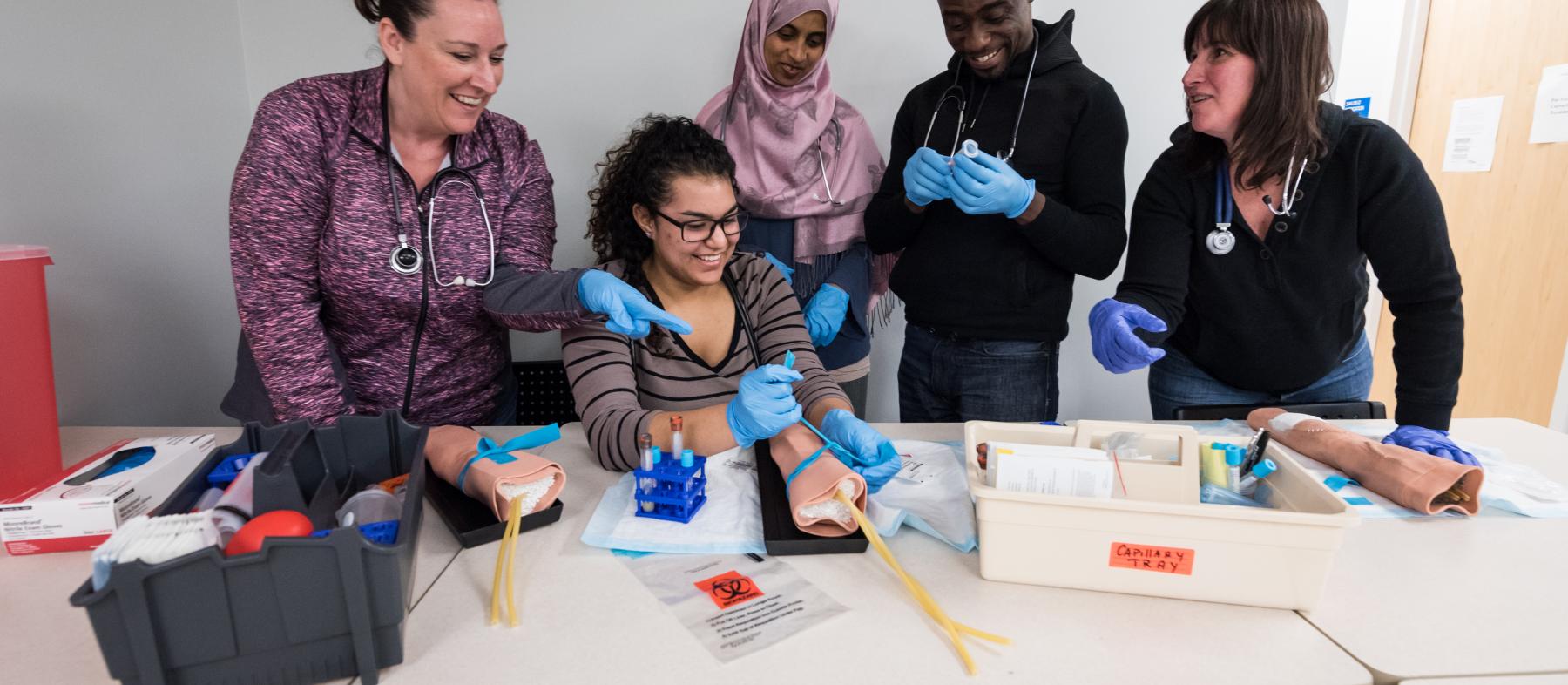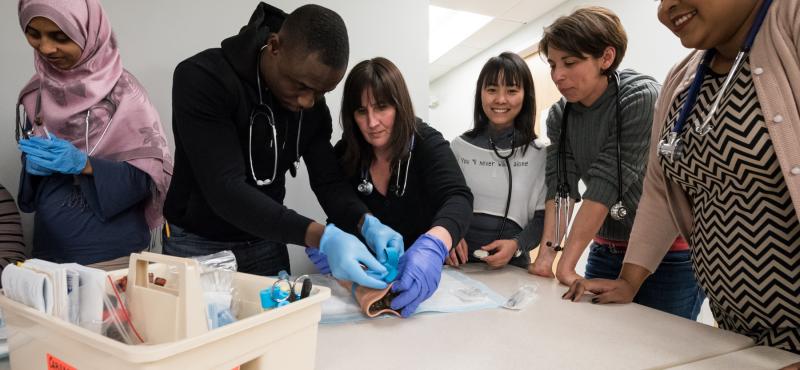Program Goals:
The goal of the Medical Assisting Certificate is to prepare medical assistants who are competent in the cognitive (knowledge), psychomotor (skills), and affective (behavior) learning domains to enter the profession.
Student Learning Outcomes:
Upon completion of the program, graduates will be able to:
- Demonstrate proficiency in performing entry-level clinical and administrative procedures of the medical assistant profession.
- Achieve employment as an entry-level medical assistant.
- Demonstrate appropriate critical thinking skills, including written, verbal, and non-verbal communication.
- Work effectively as part of a team.
- Recognize the importance of continued professional development.
- Apply principles of teaching and learning into the delivery of care to patients and families.
- Effectively communication with patients.
- Discuss the responsibilities and scope of practice for Medical Assistants.
- Show proficiency in the use of technology in the delivery of patient care.
Admissions Process:
Admissions inquiries should be directed to admissions@qcc.mass.edu. Prospective students may apply to the program of their choice by following the enrollment steps at www.QCC.edu/enrollment-steps.
Program Admissions Requirements:
Students should note that some first semester courses carry minimum prerequisites. Refer to the program grid.
- High School Diploma or GED/HiSET.
- Attendance at a Health Information Session or complete FYE 102 with a grade of “C” or higher.
- Must show evidence of being compliant with the immunization requirements specified by the Massachusetts Department of Public Health. Additional immunization requirements will be required for clinical experiences.
Program Retention / Progression Requirements:
To be eligible to continue in the program, students must:
- Achieve a grade of “C” or higher in all program courses designated by MSS.
- Maintain documentation of current Healthcare Provider Level BLS/CPR Certification.
- Maintain documentation of immunization currency and satisfactory health status.
- Maintain documentation of annual TB testing.
- Maintain documentation of health insurance.
- Be aware of the occupational risks associated with Medical Assisting, including:
- Exposure to bloodborne pathogens. Bloodborne Pathogens means pathogenic microorganisms that are present in human blood and can cause disease in humans. These pathogens include, but are not limited to, hepatitis B virus (HBV) and human immunodeficiency virus (HIV). United States Department of Labor, OSHA, September 5, 2019 (www.osha.gov/laws-regs/regulations/standardnumber/1910/1910.1030).
- Exposure to infectious diseases.
- Sharps injuries.
- Exposure to chemicals and drugs.
- Ergonomic hazards (lower back pain) from lifting, sitting, and repetitive tasks.
- Latex allergies.
- Stress.
Program Readmission Requirements:
There is a one-time readmission policy for the program.
- Readmission is not guaranteed and is always based upon space availability.
- Students who did not earn a grade of “C” or higher in MSS 111 and MSS 112 need to re-apply to the program through the Admissions Office. Students need to meet the current admission requirements. Students should contact the Program Coordinator as soon as they receive the notification of being placed on the waitlist (by April 15) to discuss readmission.
- Students who did not earn a grade of “C” or higher in any other MSS course should contact the Program Coordinator by April 15 to discuss readmission.
- Students who have been dismissed or administratively withdrawn from a program within the School of Healthcare at Quinsigamond Community College for reasons of “clinically unsafe practice/behavior” or who violate the College’s Student Code of Conduct or Policy on Affirmative Action are not eligible for admission/readmission to any Healthcare program.
Program Graduation Requirements:
Students must satisfy all course and program requirements, including regulations related to attendance and conduct, in order to be eligible for graduation.
CORI, SORI, Finger Printing & Drug Testing:
Criminal Offender Record Information (CORI), Sex Offender Registry Information (SORI), and National Background checks are required in the program, either annually or every semester. Fingerprinting and drug testing may be required. Fingerprinting and drug testing results must meet clinical requirements. An issue with CORI/SORI, National Background, fingerprinting and/or drug testing could prevent a student from participating in a clinical/field rotation, which could result in dismissal from the program.
Additional Cost:
See the Program Fees page.
- Students should anticipate additional expenses for uniforms/clinical wear, textbooks, licensing exams, and parking fees at clinical sites.
Technical Performance Standards:
See the Technical Performance Standards page. (Note: Not all programs have technical performance standards).
Credit for Prior Learning:
Credit for Prior Learning (CPL) allows students to use skills they already have towards a college degree or certificate. Work, life, volunteer and military experience may be translated into credit, allowing students to take fewer classes and earn their degree faster. CPL eliminates redundancies for students who have already earned credentials or mastered skills required for their program of study. Email experience@qcc.mass.edu for more information and eligibility.
Career Outlook:
Please consult the Massachusetts Career Information System at https://masscis.intocareers.org/ or the Occupational Outlook Handbook at www.bls.gov/ooh/ for specific occupational information. The CIP code for this program is 51.0801.
Transfer Articulations & Opportunities:
Prospective students may learn more about transfer articulation agreements at www.QCC.edu/agreements. More information regarding transfer opportunities is available at www.QCC.edu/transfer.


